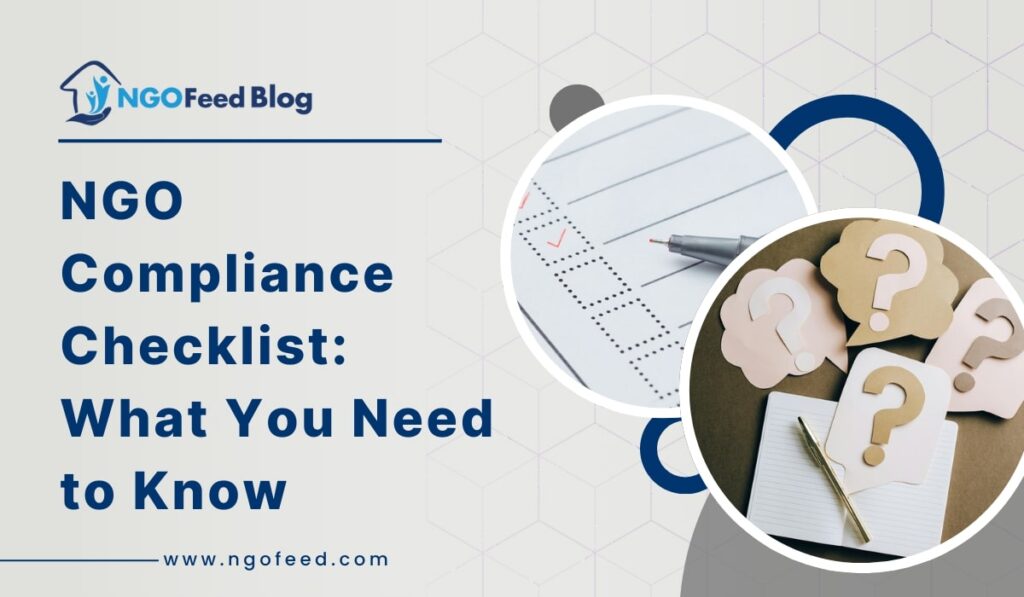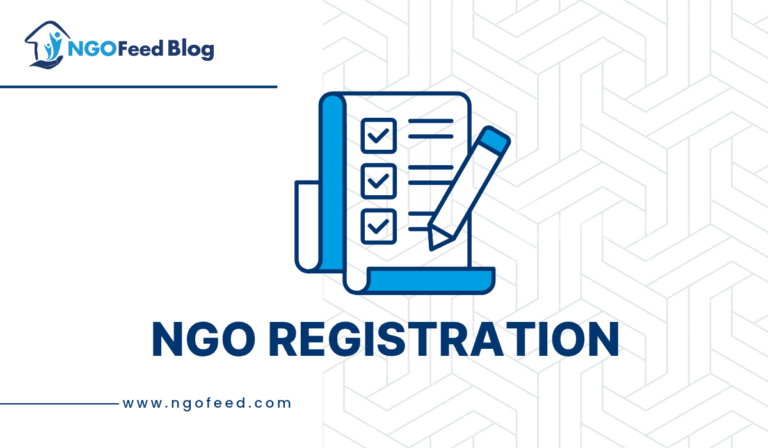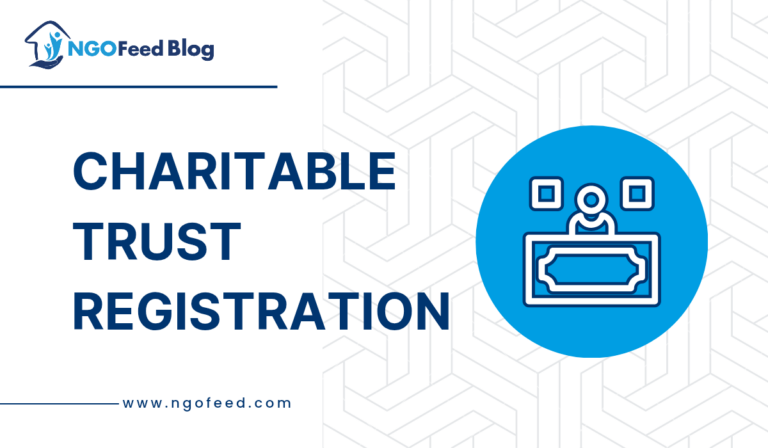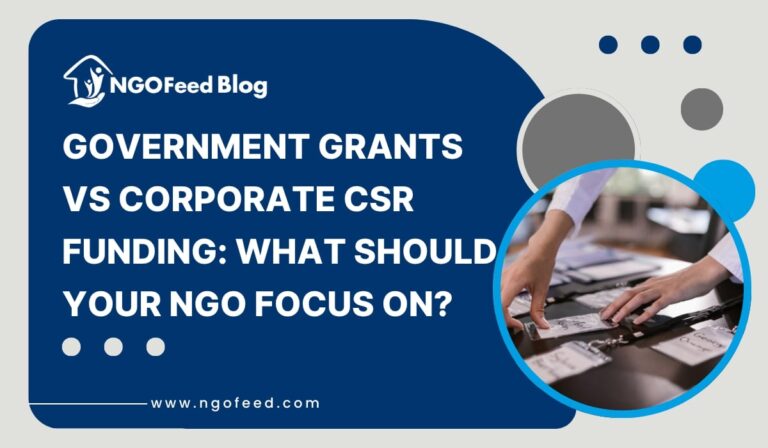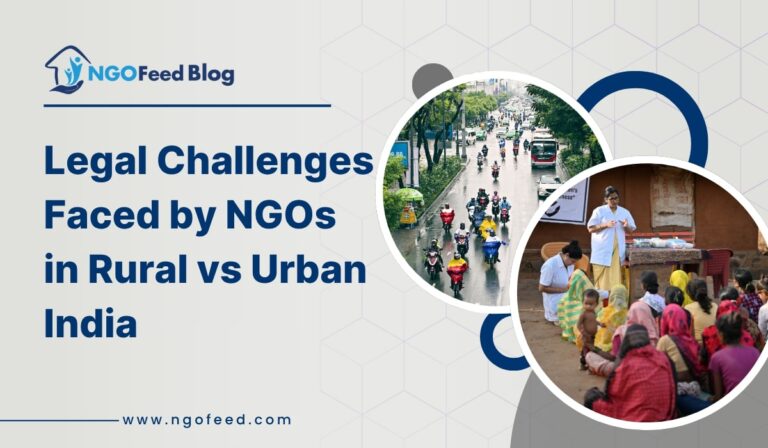NGO Compliance Checklist: Non-Governmental Organizations (NGOs) serve to combat social, environmental and developmental challenges all around the world. However, NGOs cannot fully function or grow sustainably without working within a legal and regulatory framework that enables transparency and accountability, and promotes alignment with the very goals that helped them establish their presence.
For this reason, compliance checklists are particularly useful for NGOs to not only remain legally valid, but also keep donors’ trust and fulfill reporting obligations. This compliance checklist identifies compliance requirements that NGOs need to be aware of, with a focus on the Indian context but with a global perspective.
Table of Contents
Understanding NGO Compliance Checklist
What is Compliance for NGOs?
Compliance means obeying certain rules, regulations, and legal systems to which an NGO is subject. The types of compliance can include:
- Statutory compliance (registration, auditing, tax exemption).
- Governance compliance (board meetings, resolutions, policy frameworks).
- Financial compliance (accounting standards, donor funds and utilization, reporting).
- Recurrent feasible compliances (Secial Reference Act, FCRA in India).
What is the Importance of Compliance for NGOs in India?
- Legal presence: complies legally make certain of existence and recognition.
- Digital trust: transparency helps to enhance credibility with donors and grant making agencies.
- Operational efficiency: revenues cut bait on the regulations avoiding clarity and processes blocking revenues through penalties, fines and the acceptances.
- Sustainability: compliance provides an in keep for a sustainable future.
NGO Types and Their Compliance Requirements
Different NGOs in India follow different compliance structures:
| NGO Type | Governing Law | Key Annual Compliance |
| Trust | Indian Trusts Act | Audit, ITR, 12A/80G upkeep, governing body records |
| Society | Societies Registration Act | AGM, audit, managing committee report, renewal filings |
| Section 8 Company | Companies Act, 2013 | AGM, board meetings, AOC-4, MGT-7 filings, audit |
| FCRA NGO | FCRA Act | FC-4 filing, FCRA audit, renewal, bank account norms |
NGO Registration and Legal Structure
Selecting the Appropriate Legal Structure
Different legal forms are allowed depending on the NGO’s purpose:
- Societies Registration Act, 1860 (for societies).
- Indian Trusts Act, 1882 (for charitable trusts).
- Section 8 of Companies Act, 2013 (for a not-for-profit company).
Each legal form has a different structure of compliance, governance, and regulatory oversight.
Also Read: Government Grants vs Corporate CSR Funding
What is Required to Register the NGO
- Memorandum of Association (MoA) or Trust Deed.
- Rules & regulations or Articles of Association
- Proof of office (registered office).
- Identity proofs of founder and governing body members.
Governance and Board Obligations
Governing Body Obligations
- All NGOs must have a governing body or board of trustees/members.
- The governing body must hold regular meetings (quarterly or annually as required).
- All minutes of meetings must be disposed of and archived correctly.
Policies and Codes of Conduct
- Conflict of interest policy.
- Anti-fraud and whistle-blowing policy.
- Child protection and safeguarding policy (for NGOs working with children).
- HR and volunteer management policies.
Annual General Meetings (AGM)
- Adopting audited accounts.
- Adopting annual report.
- Where required, electing or re-electing governing members.
Financial Compliance
Maintaining Books of Accounts
NGOs must maintain transparent and updated books of accounts in accordance with applicable accounting standards. These typically include:
- Cash books, ledgers, and vouchers.
- Bank reconciliation statements.
- Asset registers.
Also Read: GST Registration for NGOs
Annual Audit
- Appointment of a Chartered Accountant (CA).
- Timely completion of statutory audits.
- Submission of audited financial statements to relevant authorities.
Budgeting and Donor Fund Utilization
- Ensure funds are used strictly for charitable purposes.
- Maintain donor-wise and project-wise fund utilization records.
- Report unutilized funds and carry-forward amounts transparently.
Taxation and Exemptions
Income Tax Compliance
- NGOs must apply for a Permanent Account Number (PAN).
- Filing of annual Income Tax Returns (ITR-7).
- Maintain records of receipts, grants, and donations.
Tax Exemptions
- Section 12AB Registration: Provides exemption on income generated by the NGO.
- Section 80G Certification: Allows donors to claim deductions on their donations.
- Ensure renewal of registrations on time (mandatory periodic revalidation introduced post-2021).
Goods and Services Tax (GST) Compliance
- NGOs providing services for consideration may fall under GST.
- Donations earmarked for charitable purposes are generally exempt.
Foreign Contribution Regulation Act (FCRA) Compliance
Registration under FCRA
Any NGO receiving foreign contributions must:
- Obtain FCRA registration or prior permission from the Ministry of Home Affairs (MHA).
- Open a designated FCRA bank account (currently with SBI, New Delhi main branch).
Utilization of Foreign Funds
- Funds must only be used for declared objectives.
- No diversion of funds for prohibited activities (e.g., speculative investments).
Annual Returns
- NGOs must file FC-4 return annually.
- Disclose foreign contributions received, sources, and utilization details.
Also Read: Legal Challenges Faced by NGOs in Rural vs Urban India
Renewal and Compliance Monitoring
- FCRA registration is valid for 5 years and must be renewed.
- NGOs must also comply with MHA scrutiny and inspections.
Labor and Employment Compliance
Employee Contracts and Records
- Appointment letters, salary structures, and leave policies.
- Adherence to minimum wage laws and working conditions.
Provident Fund (PF) and Employee State Insurance (ESI)
- Mandatory registration if the employee threshold is met.
- Timely deduction and deposit of PF/ESI contributions.
Professional Tax and TDS
- Deduction of professional tax (state-specific).
- Deduction of TDS (Tax Deducted at Source) on salaries and payments to contractors.
Reporting and Transparency
Annual Report
Every NGO should prepare an annual report highlighting:
- Activities undertaken.
- Achievements and impact metrics.
- Financial summary.
- Future plans.
Public Disclosure
- Upload key documents (registration, annual report, audited accounts) on the NGO’s website.
- Disclose donor contributions and utilization where applicable.
Donor Reporting
- Provide utilization certificates to institutional donors.
- Ensure transparency to build long-term donor relationships.
Also Read: FCRA Registration vs Non FCRA NGOs: Pros & Cons
Digital and Data Compliance
Data Protection
- Secure handling of donor, beneficiary, and employee data.
- Compliance with emerging data protection laws (such as India’s Digital Personal Data Protection Act, 2023).
Online Fundraising Regulations
- Adhere to RBI and Payment Gateway guidelines for online donations.
- Transparency in crowdfunding platforms and proper disclosure of fund usage.
Sector-Specific and Local Compliance
State-Specific Rules
- Registration with local charity commissioners (in states like Maharashtra, Gujarat).
- Adherence to state-level labor, tax, and stamp duty requirements.
Activity-Specific Compliances
- NGOs working in education: Must comply with RTE Act, affiliation norms.
- NGOs working in health: Compliance with Clinical Establishments Act, biomedical waste rules.
- NGOs working with children: Must comply with the Juvenile Justice Act, POCSO Act.
Risk Management and Internal Controls
Internal Audit and Checks
- Periodic internal audit apart from statutory audit.
- Segregation of duties for fund handling.
Fraud Prevention
- Strong financial controls.
- Whistleblower mechanisms.
- Monitoring and evaluation frameworks.
Insurance and Safeguards
- Liability insurance for trustees.
- Health and accident insurance for employees/volunteers.
Also Read: NGO Registration for Religious or Spiritual Purposes: Rules and Restrictions
Compliance Calendar for NGOs
Monthly/Quarterly
- Keep books of accounts.
- Deposit TDS, PF and ESI (if any).
- Conduct board/management meeting.
Annually
- Income Tax Return (ITR-7).
- FCRA return (if any).
- Conduct AGM and approve audited accounts.
- Renew 12AB and 80G in time.
- Publish the annual report.
Conclusion
Compliance is a legal and regulatory requirement for NGOs but it is fundamentally an exercise in trust, credibility and sustainability. Compliance with legal compliance, financial compliance, governance compliance and reporting compliance, protect NGOs from financial penalties, preserve the trust of donors and allow them to progress with their mission.
Also Read: NGO Registration Under Indian Trust Act: A Beginner’s Guide
With a compliance checklist in place, NGOs can endorse a proactive rather than reactive compliance plan work quickly to minimize risks and capture transparency. In 2025 and beyond, with scrutiny being brought by governments and donors, the NGOs in a position to embed compliance in their DNA will be the ones to endure sustainably, scale and deliver significant societal and environmental impact.

